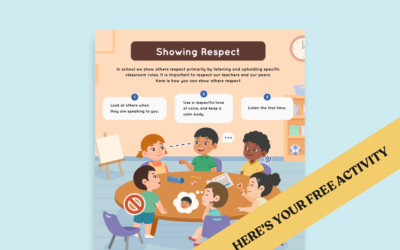Everyday Speech Blog
Social Skill Lesson Plans and Articles
Practical Strategies to Build Confidence, Connection, and Problem-Solving on the Playground
Recess should be the best part of the school day. But for many educators, it’s the moment they brace for impact. What should be 20 minutes of fun often spirals into tattling, tears, and playground “wars” that spill into the afternoon. If you’ve ever found yourself...
14 Back-to-School Activities for Listening, Respect, and Transitions
The start of the school year is full of excitement and change. New classrooms, new routines, and new relationships mean students need more than academic skills to succeed. They also need clear guidance on how to listen, follow directions, respect others, and move...
How to Teach Executive Functioning Skills (Clinician-Tested Strategies)
Executive functioning skills are essential for success in both the classroom and daily life. These mental processes help students stay organized, start tasks, manage time, adapt to changes, and regulate their emotions. When executive functioning breaks down, students...
Teaching Situational Awareness: Strategies and Free Activities to Help Students Adapt
Every day, students move through different environments — classrooms, hallways, lunchrooms, small groups — each with its own expectations and social norms. For some learners, it’s easy to adjust to these changes. For others, it takes direct support and repeated...
20+ Self-Regulation Strategies, Tools, and Activities for PK-12 Students
Self-regulation is one of the most important skills children and adolescents can develop. It helps students manage their emotions, thoughts, and behaviors so they can navigate challenges, build positive relationships, and succeed in school and beyond. From pausing to...
Conversation Skills Activities for High School Students
By high school, conversations become more nuanced. Students are expected to shift between informal peer interactions and more formal exchanges with adults, adjust their tone and language, and handle topics that are increasingly complex or sensitive. Strong...
Conversation Skills Activities for Middle School Students
In middle school, conversation skills become more layered and socially demanding. Students are expected to respond to different audiences, adapt their language based on context, and participate in more dynamic exchanges with peers and adults. These skills affect more...
10 Conversation Skills Activities for Elementary Students
Strong conversation skills help elementary students become confident, collaborative communicators. At this age, students are learning how to start and maintain conversations with peers, stay on topic, and express themselves appropriately in social settings. These...
How to Prevent the Summer Slide (Free Materials for PK-12)
When school ends for the year, social learning often pauses. Without structured routines, peer interaction, and adult support, many students begin to lose the communication and self-regulation skills they worked hard to build. This regression—often called the summer...
No-Prep Activities
Changing the Channel on Big Emotions: A Guide for Educators
Introduction Emotions and feelings are an inherent part of our daily experiences, and they can be both positive and negative. Sometimes, we encounter big, negative emotions like anger, frustration, or sadness, which can dominate our thoughts and impact our...
Teaching Conflict Resolution and Problem Solving Skills to Special Education Students
Introduction Conflicts are a normal part of life, and learning how to navigate them is an essential skill for students in Special Education. In this blog post, we will discuss the importance of teaching students to handle conflicts with friends using the Problem...
5 Golden Rules of Play for Elementary Students: A Guide for Educators
Introduction Playing with others is an essential part of children's development, and establishing a set of guidelines can help ensure that everyone has a positive experience. The Five Golden Rules of Play are designed to help elementary students learn how to interact...
Enhancing Focus and Self-Regulation with the Five Finger Breathing Exercise
Introduction Incorporating Social-Emotional Learning (SEL) into the classroom is essential for fostering healthy emotional development, social skills, and overall well-being in students. One effective way to introduce SEL is by teaching students self-regulation...
Teaching Kindergarten Students the Importance of Asking Permission
Introduction Asking permission is a crucial skill for young learners to develop. It teaches them the importance of respecting others' belongings and personal space, and helps to foster a positive classroom environment. In this blog post, we will discuss the concept of...
Teaching Problem-Solving Skills through Social-Emotional Learning
Introduction Problem-solving skills are essential for students, especially those in special education. These skills can help students navigate their emotions, communicate effectively, and build positive relationships with peers and educators. In this blog post, we'll...
Teaching High School Students the Art of Humility and Avoiding Bragging
Introduction As educators, it's essential to help our high school students develop strong social-emotional skills. One such skill is understanding the importance of humility and how to avoid bragging. Bragging can make others feel annoyed or inferior, and it's crucial...
Understanding Relationships with the Relationship Ruler for PreK Students
Introduction As educators, it's essential to teach PreK students about the relationships they have with different people in their lives. Developing an understanding of these relationships helps them interact appropriately with others and fosters healthy...
Empathy: A Key Skill for Building Strong Friendships in Middle School
Introduction Empathy is the ability to understand how someone else feels and show care for their feelings through words and actions. It forms the foundation of strong relationships and helps us forge bonds with others. In a world where friendships play a crucial role,...
Teaching Kindergarten Students to Walk Slowly and Quietly in the Halls
As educators, we aim to create a respectful and calm learning environment for our students. One essential aspect of this is teaching them how to walk slowly and quietly in the halls. In this blog post, we will explore a no-prep activity to help Kindergarten students...
Teaching Open-mindedness to Elementary Students: Activities and Discussions
Introduction Dealing with change and accepting others' ideas can be challenging for children. When a child has a Closed Mind, they stick to their own ideas and are unwilling to consider other perspectives. This mindset can lead to feelings of worry and frustration and...
Developing Independence: A Guide for Educators of Middle School Students
Introduction Gaining independence is a crucial part of growing up, especially for middle school students. As they grow, students learn to take initiative, do things on their own, and rely less on others for guidance. Developing independence has numerous positive...
Switching Tracks: Adapting to Change in Group Activities
Introduction Switching Tracks is a crucial skill that helps students adapt to change, particularly when working in groups. Change can be challenging, and unexpected alterations in plans can cause feelings of anxiety or upset. To better navigate these situations,...
Teaching PreK Students the Value of Helping Others and Building Friendships
In this blog post, we will explore the importance of teaching young children the value of helping others and building strong friendships. By incorporating principles of Social-Emotional Learning, educators can impart essential life skills that will enable students to...
Teaching Effective Classroom Entry Skills: Activities and Discussions
Creating a positive learning environment starts with how students enter the classroom. Teaching students effective classroom entry skills is an essential aspect of Social-Emotional Learning (SEL). In this blog post, we will discuss an easy-to-implement no-prep...

























